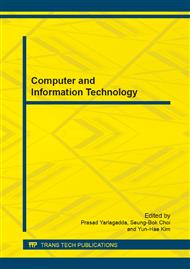p.934
p.939
p.945
p.953
p.957
p.965
p.969
p.975
p.979
Negotiation Protocol for Location Privacy
Abstract:
As metropolitan areas have expanded and been surrounded by huge buildings and complicated express ways, it has been increased to utilize advanced ICT(Information Computer Technology) devices and systems to innovate utility services such as GIS(Geographic Information System). Keeping abreast of this, location privacy has emerged as a critical issue in ubiquitous computing environments for the metropolitan areas. Nevertheless, the focus of the location privacy is only about personal location information, not about location information such as the place itself. However, in a real world, as seen in the precedent of ‘Dow Chemical vs. United States’ or in controlled areas of military districts, we have already recognized the importance of location information. In this paper, we propose a negotiation protocol to protect location information as well as personal location information. Thus, we can achieve real data protection through the negotiation-process in the respect of self-regulation.
Info:
Periodical:
Pages:
957-964
Citation:
Online since:
February 2014
Authors:
Price:
Сopyright:
© 2014 Trans Tech Publications Ltd. All Rights Reserved
Share:
Citation:


